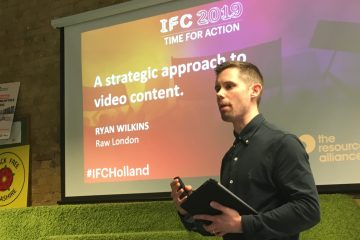The Future of Fundraising
“Wow. There are a lot of very clever, experienced and influential people here.” That was my first thought as we sat down to host the first Audience Future of Fundraising debates. This was followed by my second thought: “Don’t say anything stupid for the next two hours.”
 We’d asked some people from across the sector – fundraisers, agencies and consultants to come together and discuss the future of regular giving versus one-off donations. And we certainly did, but the conversation became a much wider debate about our supporters and how we build relationships with them. One of the big themes was how we’ve turned giving into a mass market. And how we are facing new challenges as that market matures and begins to become saturated. It was a fascinating discussion.
We’d asked some people from across the sector – fundraisers, agencies and consultants to come together and discuss the future of regular giving versus one-off donations. And we certainly did, but the conversation became a much wider debate about our supporters and how we build relationships with them. One of the big themes was how we’ve turned giving into a mass market. And how we are facing new challenges as that market matures and begins to become saturated. It was a fascinating discussion.
One of the bigger themes was how we engage with donors, not just in light of a certain media story you might have heard about, but also against a backdrop of falling responses and increasing costs. As our chairman put it: “I was looking at some results from 15 years ago and got depressed.” Yes, Tobin Aldrich is the sort of person who spends his evenings looking at 15-year-old results.
Many of us have been using the same fundraising techniques for a long time. We’ve refined, tested and innovated along the way, but a lot of the channels we use, the messages we create and the people we speak to are largely unchanged.
But there was a feeling amongst everyone in the debate that change is happening, and we’re working in an environment that is shifting. Some people asked the question: “How can we give real power to the supporter and not just pay lip service to a two-way dialogue?”. Sometimes, that can be a scary thing, but it works to takes a positive approach. One of the guests recently had to mail 350,000 donors asking for their express permission to continue communicating with them. That sort of brief would normally strike fear into even the most hardened fundraiser. But of the 350K donors contacted, just 35 asked to be removed from the database. That’s a 0.01% response rate. And they raised a lot of unexpected income too. It pays to give the donors power.
One debater even raised the question of why we need to continuously raise more money: “How about we do more with what we have, or even do more with less money.” I’d love to be in their next budget meeting. But it’s a good question: is it feasible to keep expecting more and more from our donors – an endless spiral of growth? Can we really justify that? Is it our job as fundraisers to reset expectations on growth?
And is generating income and meeting our annual targets the only measures that we should be focusing on? ROI, CPA and net income are all benchmarks that define much of our careers. But how about tasking fundraisers to improve supporters satisfaction, trust and confidence and measuring them? And what impact would that have on long-term income? Many of us want to think long-term. But we have deadlines to hit and targets to meet. So, can we balance that against a wider view where we focus on making the supporter experience a better one. Value can be measured in many ways. We should think more about what support costs us and the potential income engaged supporters could provide.
 Finding new ways to engage and connect with donors is going to become and more important. The demographic landscape is changing, society is shifting and people are looking at good causes in a different way. Articulating a clear and compelling offer to supporters and demonstrating their impact will be something everyone has to get right. As a group, we all felt that improving the donor experience is going to be a big part of that. And that is probably as good a topic as any for the next debate.
Finding new ways to engage and connect with donors is going to become and more important. The demographic landscape is changing, society is shifting and people are looking at good causes in a different way. Articulating a clear and compelling offer to supporters and demonstrating their impact will be something everyone has to get right. As a group, we all felt that improving the donor experience is going to be a big part of that. And that is probably as good a topic as any for the next debate.

2 Comments
Richard Turner @ifundraiser · July 13, 2015 at 21:44
The reason the donor experience is so key is even more strategic than you state. In this connected world now everyone is a channel – donors too! And in this connected world you just don’t know who your donors know. That £10 a month regular donor could help unlock a major gift or a trust grant.
And to do this well means forgetting about classic ROI. It’s ni longer how can I get as much money out of my file – it’s how can inspire donors to be champion of our cause (hence great story telling is key).
And we need new measures to gauge the total impact of a fundraising programme as donors help advocate on your behalf.
Lora · October 16, 2015 at 23:13
When you build a relationship with your donors (online or in person) it helps them to understand the organization’s needs. Finding new donors is always challenging.